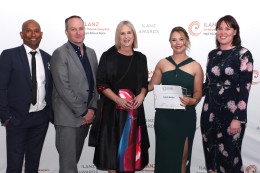Interview with 2022 Greenwood Roche Private Sector In-house Lawyer of the Year - Sarah Retter
Sarah Retter, Head of Legal, Fujitsu New Zealand Limited
 How did it feel to win the Greenwood Roche Private Sector In-house Lawyer of the Year Award?
How did it feel to win the Greenwood Roche Private Sector In-house Lawyer of the Year Award?
My initial reaction to winning the award was shock! But honestly, an honour and a privilege to be recognised by the ILANZ committee for the contribution I had made to Fujitsu NZ over the previous 12 months. I put it down to being well supported by our APAC VP of Strategy and Reputation Scott Mortimer, and the rest of the Oceania Legal & Compliance Team. Without their support I would not have been able to take on all of the challenges that I did during that time, and come out of it a stronger, more resilient, and experienced in house practitioner.
What was your highlight at the 2022 ILANZ Conference?
I am a people person, and I value relationships. Sometimes the in house world can be a lonely place, and it often feels like nobody understands or could possibly have the same challenges that you have on a daily basis. The highlight of the 2022 ILANZ Conference for me (which was incidentally my first one) was meeting, connecting and networking with all of the other in house counsel from both large and small organisations, people who understand the challenges we face on the day-to-day, and really are having the same experiences as the rest of us. Connecting in person to me makes such a difference, and is a great way to forge both professional and personal relationships.
In October 2021, you were asked to step in as Acting Country Manager during a change in leadership and received a CEO award for your contribution to moving the business forward. How did you approach this challenge and step-up during an unsettling period of change?
Change is always unsettling, especially in big organisations, but it is a constant, and something we all have to learn to live with. This role came as quite a surprise to me, and having always been in a legal role, I was quite nervous about taking it on. I had 500 people across Aotearoa, plus the Executive Leadership Team in Australia relying on me to keep the business functioning. I had a good working knowledge of the business already, so I jumped in, boots and all, and did what I could to ensure stability and continuity as far as possible. I tried to keep positive, keep the people informed, and let them know I had their best interests at heart. The bits I didn’t know, or understand, I made a real effort to get to the bottom of, so that I could give the new Country Manager the best introduction to our business that we could offer.
I took lessons I have learned from some of the great leaders I have had the pleasure of working with over the years, and got to apply them in real life situations. I learned to trust my gut, make decisions under pressure, manage complex people situations, and manage my time more efficiently. It was really difficult to take a step back from my legal role, and I had to think of that as taking off that hat, and putting on a different one. My legal colleagues and my manager all supported me to take on this challenge – they juggled workloads and responsibilities to allow me to have this opportunity, and I can’t thank Fujitsu enough for putting its trust in me and giving me such a great experience, all the while, keeping my legal role open so I could go back to it.
You spearheaded an initiative to increase Maori and Pacific inclusion in Fujitsu’s business plan. Tell us more about this initiative.
There was a time in 2021, where I looked around and suddenly identified that Fujitsu was doing a lot in the Reconciliation Action Plan space in Australia, but there was no similar recognition for Māori and Pacific Peoples in Aotearoa. In the age of inclusion and equity, this struck me as a real weakness, both in terms of attracting talent to Fujitsu and increasing opportunities for people of Māori and Pacific origins, but also in terms of understanding why it was important.
As a company, we have an obligation, in my opinion, to recognise and celebrate the communities in which we operate for their unique qualities and the rich experience they can contribute to our organisation and society as a whole. So, as a result, I set about getting our Māori and Pacific Peoples Inclusion Plan drafted, which you can find here. The Plan sets out our goals and commitments over 5 years and was drafted in such a way so as to be flexible enough to allow the organisation to evolve in its understanding and the activities needed, but also contains some measures so that we can calculate our impact.
Last year saw us take some steps on the initial journey, which included engaging in a partnership with Tupu Toa. We hosted our first two interns across the end of 2022, and into 2023. They have just finished up, and recently presented to us an initiative that they developed building on the skills and capabilities of our own organisation and sharing these with rangatahi. We will be taking two more interns from Tupu Toa this year, and we look forward to making this a regular programme in our business.
As 2023 shapes up, we will be working towards a greater understanding of the importance of the mahi required to achieve the objectives in the Plan, and what Te Tiriti really means for Fujitsu in Aotearoa.
What would you say to someone thinking about nominating themselves or someone else for an award?
If  you think you/they deserve it, then you/they probably do! We so often forget to celebrate our own successes and are constantly looking for the next thing to ‘get on with’. We don’t take enough time to reflect on our own achievements or those of our colleagues, and I would encourage everybody to make time to do that more regularly. If this is the prompt you need to get thinking, then don’t hesitate. It is so rewarding to be recognised by your peers for the contribution you make every single day.
you think you/they deserve it, then you/they probably do! We so often forget to celebrate our own successes and are constantly looking for the next thing to ‘get on with’. We don’t take enough time to reflect on our own achievements or those of our colleagues, and I would encourage everybody to make time to do that more regularly. If this is the prompt you need to get thinking, then don’t hesitate. It is so rewarding to be recognised by your peers for the contribution you make every single day.
The 2023 ILANZ Awards nominations are open until Friday 31 March.
